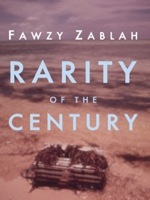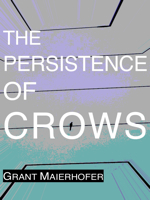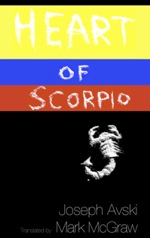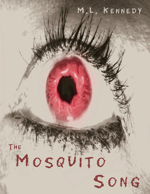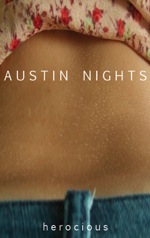THERE IS NO YEAR
Blake Butler {lives here}
Harper Perrenial, 2011
Day 1 (start – 69)
The father doesn’t like it when his son wants to dress up dolls. The father buys the son footballs even on the father’s birthday. The effeminate son is a kind of character being incorporated and explored in today’s narratives. ‘Unites States of Tara’ has a similar character. ‘American Beauty’ also explores this kind of character, or at least the origins and consequences of this kind of character, if not the character itself. This was something I noticed in TINY, and I thought it was a great character to build forever on paper. The son. The son is the only one who still has a copy. The mother pushed the other two copies down beneath the surface of the earth. The copy mother went down easier than the copy father, but both went down, both had their lights extinguished. I think, so far, I am into this book. There’s a certain quality about it that, though, done many times in cinema. It hasn’t really be done successfully in literature. I don’t want to use that word. The Lynchian narrative in literature is rarely, to my mind, pulled off seamlessly, indispensably, without being gimmicky or superfluous. I’ve read it before, but mostly it turns out too other worldly to mean something real or urgent. I think María Luisa Bombal writes this way. I think Frida Kahlo paints this way. I think Blake Butler does something like these people, only his version is even more immediate than the others because he’s saturated with the internet.
Day 2 (70 – 178)
Image of mother standing parallel to son with a wall between them, moving mirrored. (71)
While I haven’t read more than the typical amount of Poe, if that even, I feel like Butler’s house is just the kind of symbol Poe either already wrote about, or is writing about now, through Butler. Feeling this way is interesting to me. Because really, the book is being written as I read it. It hasn’t already been written, edited, printed and bound, it is coming into existence as I read it. A book only starts aging if you reread it. Rereading books, I think, ages the book. But so long as you only read it once, maybe going back and reading sentences and graphs and words you particularly like, the book grows with you, and only lives once, and then, if left alone and shelved after that, becomes unstuck in time, timeless, without time. Dare to read it again, dare to put it back in time, into a chronology, then and only then will it begin to age. I’m gripping my ballpoint pen hard, too hard really. I have to relax, I’ve written nothing to get excited about, nothing new under the light, under the sun, two completely different things. And now my hand is hurting, more specifically, my wrist, my snuff box.
So far there is no absent father figure, and the mother seems to know what she’s doing. This is a nuclear family that is actually quite functional. But, now that I’ve finished the book, I know this changes. The father stays away longer. His commute to work lengthens. When he does return, he doesn’t remember the son at all. So there really is an absent father figure, confirming my idea that absent fathers are starting to make their mark on indie literature, a kind of under-commentary on the state of things.
On page 89 the etiology of the son’s nameless and debilitating disease is discussed, presented as a hairy man in a yellow shirt stretched around the neck, his face covered, this man puts his thumb inside the son’s mouth and speaks to him through it. The thumb expands inside the son’s mouth. The thumb is crooked. This seems overtly sexual to me, phallic and felating. The son felt deboned in the sick days, almost as if the disease actually changed his composition, changed his physical gender. I think a psychological change preceded this. Maybe not. Deboned: You debone a fish when you take everything bony out of it, everything hard, leaving the fish soft, emasculated, boneless.
Interesting that the first mention of the copy egg comes at the advent of white paper. The book has been printed on gray paper, like poorly made photocopies. Now, precisely after the egg is found (mowing the grass the mother runs over it) the pages are white. Eggs are often thought to have white shells, and typically do, but there are also brown eggs with a darker yolk. These eggs typically come from local farms, where the chickens are let free to run wild and eat how they want to eat, far from the pressures of an industrialized nation. I don’t imagine the father, the mother, or the son being concerned with the whereabouts of their food. The father eats fast food twice on his 6 hour drive home from work. He is a fast food veteran. He orders the same thing from the same (but different) place and distinguishes a difference in taste.
The egg. What to make of it? It is a video game controller. It is the way to cheat if certain combinations are pressed. It’s a vibrator that fills the mother up with orgasms. It grows, get’s heavy, contracts a meaty voice, and becomes too intrusive, too loquacious. The mother must shut the egg up, push it into the earth. This is the only way things can be eliminated, wiped off the face of everything we know, you must push them down, bury them.
Page 97 = “She would not think about how the son could just go climb into the freezer in the garage, or in the magic trunk stored in the attic, or how everywhere there were roads and overpasses, and cars driving under, piloted by whomever.”
- Fathers become caterpillars when they’re reborn.
- “Some small exact place.” (102) (20)
Do the gradients of gray to white correspond to mood, to heartbeat, or maybe they denote highlights? Is there a pattern? My gut instinct is no. But there is a lot of design in this book. It’s not glossy, not at all. It’s more coarse than matte.
The earth = “a single curving surface on which any flesh must walk or lay.”
- All the things I lost, I lost on a train.
Page 115 = “At the door, through the thick peephole, the sweating mother saw a man. Not the man she’d hoped to see there, he with such hands, but her husband, balding.”
Page 122 = son is referred to using feminine pronoun and then the mother corrects herself. TINY explores the lines of gender.
- “making a memory of the moment, that would last a lifetime and forever.” (127)
- “the three bodies’ collective assemblage of six nostrils quivered in and out.” (128)
(My tiny cat is staring at me now. We’re sitting on our balcony on a windy Austin night.)
Description of wallpaper. Butler writes like he’s on LSD, tripping. Seems like this is drug-induced writing, which seems all right with me. But can we take any of this seriously even though it is written very seriously, at least I think this is the case. I know he wrote the majority of the text, or not exactly know but know of through his own account to another, hearsay, that he stayed awake for long intervals, watched specific movies, ate certain doses of food and drink, didn’t leave his room really, this went on for something like 10 days or more. So even without shrooms or LSD, Butler was feeling the strangeness of a very condensed and tight world. Like an Aphex Twin video, something electronic and made of integers.
Wait. I take it back: Michael Cunningham – not David Lynch – should take this book, lick it, eat it, digest it, sweat through a vision, and then render.
- Synesthesia can be fabricated.
The house is like a computer. Butler draws this comparison using keywords, like ‘copies’ and ‘phony bells’. Seems like these internet writers, meaning writers who became public figures thanks to the internet and relationships over the internet, these writers, this matrix of IP addresses, find mimicking internet in their writing mandatory, almost like homage to their greatest silent benefactor.
- This is like ‘Poltergeist’.
Any horror film, but more psychological horror. Flickering lights, prolonged humming, beeping, blurred mouths, blurred faces, portals of light, mirrors with disobedient reflections. The house has keys, things to collect like talisman, like Zelda. Seems like every reviewer relates this book to other things it reminds them of. It’s because, I think, this book is a product of our times. Every single image, and sometimes succession of images, exists somewhere else, and this is a copy of it. How original is anything, knowing that, how original is this facsimile?
The idea of being so loud you cannot be heard, a silence so loud it can’t be heard, maybe this is the appeal of screamo. “Silence – or something so loud or strung out there was nothing to be heard.” (131)
- Eponymous echo: “There is no year.” (178)
Day 3 (179 – 222)
First white section an egg was found, something symbolizing gestation and birth and new life. The alpha. Second white section a black package is found, like a black egg, inside there is no new life, only pictures of dead people, pictures that don’t blink, provide no orgasms, no pleasure, records of expiration. The Omega.
“The bag held its mouth closed with a metal zipper. / The son unzipped the zip. / He held his face up to the bag and looked in. / There was nothing in the bag. / No smell, no light, no hour.” (209)
Like his blog, Butler begins to right justify his text in parts. He colors ‘bloodred’ and puts ‘fat’ in bigger font size and puts ‘enormous box’ in bold. These are experimental strokes of the brush. Not sure if they’re necessary but they don’t detract from the story, I think.
- In tiny bits, it’s clear that the narrator loves books & words.
- It’s great to write about cigarettes: “The mother dragged the last ash from the cig and tabbed the butt against her whitish tongue and pressed her tongue against the mouth roof and sucked a little with saliva and chewed and choked it down.” (222)
Day 4 (223 – 334)
- The father prays. His prayer results in indigestion, the smells of.
- Reading words against a dark background and then looking somewhere else leaves an impression in your eyes, makes things look like ant tunnels.
- Page 223 introduced me to a new feeling when living as a reader. The way the graphs/blocks repeat. I feel grooves inside my brain, or at least the membrane behind my eyeballs. Butler describes this on the next page, “the girl’s directions were several pages long and writ in ink that changed colors in the light. The son read them again and again, over and over until he could hear them in his head.” (235)
- Butler likes certain words: light, chrysalis, ash, worm (or deworm), debone, money, sluiced, hulking, writ, mirror
- What is definition of chrysalis? Googled: chrysalis def. Got: A pupa, especially of a moth or butterfly, enclosed in a firm case or cocoon.
- I feel like the story has broken down some. It’s much more of a dreamscape now. It doesn’t seem to be speaking to a wide audience, far less accessible. I feel like this is the noise/distortion that probably (hopefully) precedes the chorus, the tonic.
- Just thought about PEDRO PÁRAMO.
- Just thought of the idea, “Uncomfortable in my skin.”
- wet, tiny, gristle, sag, fat, curdling, blood, meat, pucker
- Claustrophobic people will have a panic attack (rated 9 on the SUD scale) if they read TINY. Butler wants to fit the agora into a box.
- Hunger looks like hungry light.
- Page 267 = “All the books were copies of the same book.”
- They have only been in this house, this is the house they used to live in.
- What does shark shit look like?
- Tiny is the most repeated word in the story.
- Page 288 = “The father was at an age when eighteen months would not vastly change his outward physical appearance greatly, though some more of his hair had fallen out or molted white.”
- Page 297 = “… every word he’d ever said replayed together, compressed into one brief, marbled gob.”
- There is little dialogue. This is some on page 298 = “I made that for you, the girl said, sighing. Or had it made. Regardless. Do you like?”
- There is a butler in this story: “The butler fed me, he said, in spouting old voice, then again he could not speak. What butler? the girl said. What butler?” (299)
Day 5 (335 – 360)
- Poltergeist influence confirmed on page 347: Heather O’Rourk interview.
Day 6 (361 – 362)
Feel like some momentum has been lost, which wouldn’t be a problem if the text weren’t trying so hard to maintain/increase momentum.
Day 7 (363 – 368)
The pummel of my heart, my pummel, moves my legs side-to-side. It’s subtle, but when the rest of my body stills, I can feel my pummel rebounding rhythmically off the bench, and my legs, which are crossed like a man’s: Left ankle on right thigh/knee.
Day 8 (369 – 401)
- Huffing.
- What does ‘smuggy sun’ mean?
- “Gun shops did their business and did it well.” Bob Dylan homage. (374) Overall, a nice page.
- I think the last time I read the word ‘cauterized’ was something of McCarthy’s. Probably ALL THE PRETTY HORSES.
Final Thoughts
This book is large. It seems like it wants to be something bigger than itself, but it’s already pretty big. Somewhere in the middle things started to dissolve too quickly for me to keep my footing. I think things became too experimental for me. But it’s not really that the images became too abstracted, but the writing didn’t seem to bring them to life, make them urgent enough to care. Also, there was no return to the tonic. I did not tingle. There’s some room to ruminate, though, and I’m happy that a publisher like Harper Perennial took the risk with someone who may be too far afield for some people.
After reading TINY, an adult actress – according to Butler – said it ‘erased time’ for her. I can see how TINY could do that. But for me time wasn’t erased. For me, I felt the tick of each time the word ‘tiny’ was used, and no matter what was going on, the repetition of that word reminded me of what I was doing.
I think Scott McClanahan says it best, though, about people like me. Little people who write and put it on the internet and think this somehow gives us the right to dismiss someone’s baby.
But, based on what I know about Butler, he doesn’t mind people desecrating his books, not that that’s what I’m doing. Not at all. You should read this book if you think you’d like it. But that aside, Butler ran a video contest in which people recorded different ways to destroy SCORCH ATLAS, his previous work published by Featherproof Books. Butler isn’t your typical bibliophile. He ate his book, actually chewed the pages, he is his book, or he was until he excreted.
This month the bibliovore has a new book coming out from Harper Perennial, a work of non-fiction about sleep called NOTHING: A PORTRAIT OF INSOMNIA. I want to read this book. The buzz surrounding it is thick. If nothing else, it will be intensified.
My Rating = ![]()
![]()
![]()
![]()
![]()



